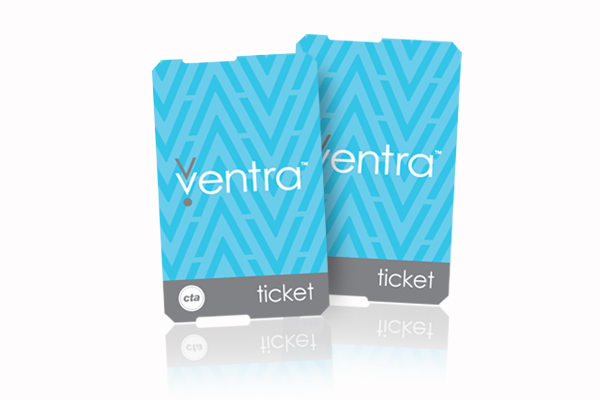
photo: courtesy ventra chicago
The CTA announced plans for Ventra this past September, but the city’s new fare system—set to launch summer 2013—is still raising some questions. Like the one going around the Chicago office this morning: What's the deal with this weird new Ventra thing?
Here is a breakdown of some of the changes CTA riders will face with Ventra’s launch.
What are the payment options for riders under the Ventra system?
- Ventra Cards: You can load any amount of money on a Ventra card with cash or with an online Ventra account. You can use the to pay per ride or load unlimited ride passes onto the card.
- Ventra Tickets: These are disposable, paper cards used for single ride and day pass unlimited-ride tickets.
- Personal bank issued credit cards: You can link your personal credit and debit cards to your Ventra account and add transit value, or purchase unlimited-ride passes, for use with that card.
How much does it cost to purchase a Ventra Card?
Ventra Cards will have a one-time fee of $5 at purchase. Riders can be refunded their $5 (as transit value) if they register their Ventra Cards within 90 days of purchase. But cardholders will face a $5 monthly fee if they don’t use their card for 18 months. Users will be notified about the upcoming 18-month mark if their card is registered.
What if you lose your card?
If you lose a registered Ventra card, the balance is protected by the CTA. But it will cost riders $5 to purchase a replacement Ventra Card (and this will not be refunded).
What if you already have a Chicago Card or Chicago Card plus?
Those with registered Chicago Cards (and Plus cards) will be sent a Ventra card in the mail as part of an automatic transition and won’t need to pay the initial $5 fee.
How does Ventra affect riders purchasing single ride passes?
Single ride, disposable Ventra tickets will cost more than under the old system. A paper single ride train ticket will cost $3 (including a $2.25 train fare, $0.25 for a transfer and a $0.50 limited use ticket fee) for fares. If riders purchase Ventra Cards, or use personal credit/debit cards, they won't be charged these “convenience fees” and the cost for a single ride will remain $2.25.
So riders will be penalized for paying with cash?
Pretty much. Riders purchasing single ride, disposable train tickets will be penalized—fares will be $3.00 versus $2.25 (under circumstances listed above). But bus fares paid with cash remain the same price! If you are paying with cash even though you're Ventra cardholder, for whatever reason, you will not be penalized.
How does Ventra affect riders purchasing unlimited ride passes?
Under the new system, riders purchasing unlimited ride passes will see few changes. They will be able to pay for unlimited ride passes in 1-day, 3-day, 7-day and 30-day increments with Ventra Cards and personal credit/debit cards. The price for 1-day unlimited-ride paper tickets will remain $10 for all-day rides.
Are riders required to turn their Ventra cards into prepaid debit cards?
No. So, basically, if you're using the Ventra card, you can make it double as a prepaid debit card for use on non-transit daily purchases. You can bet there are additional fees to do that—read about them here.
When does Ventra go into effect?
The CTA is planning to fully transition to the Ventra system by the start of 2014.
Thanks to Lambrini Lukidis in media relations at the CTA for help reporting this story!



